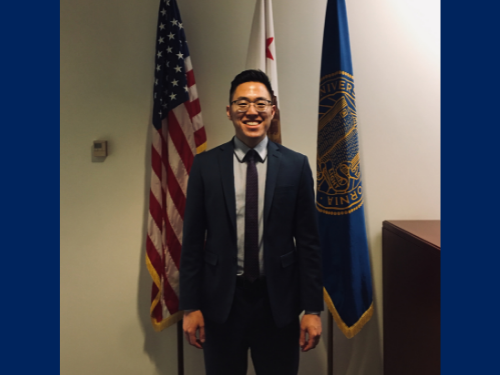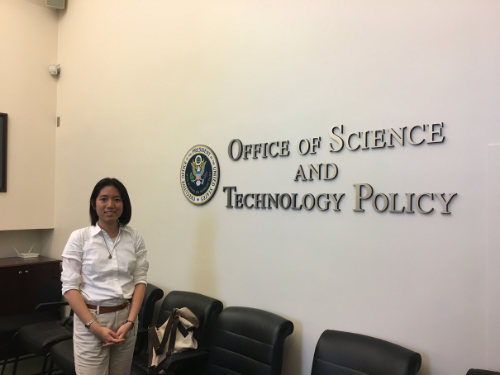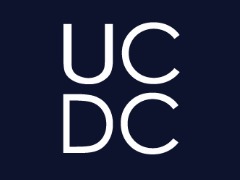Science Policy Internships
Young Jae Jeong - UCSD Government Relations Office

UCDC Cohort: Summer 2019
Major: Chemistry
Internship: UCSD Government Research Relations Office
Thinking of my time at the UCDC program of Summer 2019, the most common thought that comes up is just how much I have experienced and grown in such a short amount of time. When I stood at my commencement ceremony just two months ago, I could not have begun to imagine the number of changes I have undergone, and the profoundness of interactions I had with the people around me.
A part of this largely deals with the practical aspects of flying across the country. A week before my flight to DC, I was constantly anxious about flying by myself for the first time, staying in an unfamiliar city, and interacting with new people. I also think that because I was so afraid, a part of me knew that I had to see myself through it, in order to mature into a well-rounded person. If you are someone who can relate to this, then you need to be here. What really helped was realizing that the worst-case scenario consists of touring the nation’s capital with friends for ten weeks.
On the other hand, one of the things that stood out to me as I worked is how generous the people are in DC. If you work really hard and you are kind, people are happy to help you out. That being said, the expectations are that you need to be the one who seeks out help and that you pay it forward in the future. Additionally, interacting with various senior officials at the workplace will constantly remind you that, yes, these people are human too.
Looking back, I think of the program as an investment into personal and professional development, with the return on investment depending on how much effort is put in. At the risk of sounding like a paid advertisement for the program, I feel that this summer has been a transformative time for me. Most importantly, my internship helped me decide what I want to do. I also became significantly more open to new experiences and interactions, which is something that I have always wanted to work on. The best way I can describe it is the following: Entire worlds that I previously was not aware of now exist, thanks to this program.
Susan Hou - American Institute of Physics

UCDC Cohort: Summer 2018
Major: Bioengineering
Internship: American Institute of Physics
I interned at the American Institute of Physics (AIP), Government Relations, in the summer of 2018, and my experience was incredibly liberating, exciting and eye-opening. This summer I planned on working in science policy because helping others has always been the center of my academic and career pursuits, and also because a couple of things within my experience led me to science policy. Firstly, I chose to major in bioengineering because I could potentially develop medical devices as a career. However, I later realized that many issues within the medical device industry stemmed from health science policies. Furthermore, I’ve started to realize the importance of choosing a career in an environment and space that I enjoy living in. I hope that in the future I can choose a career that makes sense to me, that the work I’m doing impacts the world in ways I find most important. And living in a world populated with people with different values and ideas, it’s important to me that everyone is well-informed and has a fair chance in sharing their knowledge when it comes down to creating legislation. That is why as a bioengineering student, I’m extremely invested in STEM education and science policy, and this summer internship was the perfect chance for me to test the waters and think about whether I would like to pursue science policy as a career.
For 10 weeks I interned at the Government Relations (GR) department of AIP, the lobbying and networking arm of AIP. The nature of work at a GR department changes every few weeks, one moment you’re strategizing your next move for an advocacy project, the next you’re presenting at a conference about current science policy legislation. I entered the policy arena starry-eyed and eager to learn, the fast-paced environment really kept me on my toes and excited me every day at work. In my first few weeks, I attended numerous coalition meetings, meetings with university representatives and science agency government relations people. At my second day of work, I sat across the Under Secretary of the Department of Science, Paul Dabbar, during a coalition meeting. My job at these meetings was to take notes and observe fellow advocates at work. Language was the headline of the day as the meetings unfolded before my eyes, from the way someone’s motives might be buried layers under their spoken words to the body language displayed by someone who’s trying to take charge of the room. The way people interacted was all incredibly fascinating to watch, and I immediately recognized who was at the meeting to discuss important issues and who was there merely to keep their organization in the loop or to appear as an indispensable figure. After each meeting I would talk to my supervisor, Bethany Johns, asking her questions and discussing the intricacies of the meetings.
Nevertheless, I spent the bulk of my internship preparing for a two-week long meeting for the American Association of Physics Teachers (AAPT), during which I created a poster for the AIP booth, made two presentations of federal STEM education policies, wrote one-pagers detailing science advocacy contacts in various states and scheduled over 100 meetings with the Congress. The poster I created for the booth was about federal science funding trends and the current analysis on science policy issues. Without any background in policy, I branched out to people I’ve met in AIP who might be able to lend a hand. Collectively, with Mitch Ambrose and Alexis Wolfe from the FYI publishing department of AIP, we created a poster with charts and analysis on the current science policy. It was a gratifying and heart-warming experience to work together with others to contribute something original to the science society. I really realized that success, however one may define it, relies heavily on grit and collaboration instead of smarts or talent. Moreover, I corresponded with more than 40 legislative staff to schedule the Congressional meetings, and picked up some tips and tricks in Congressional correspondence on the way. The hard work paid off when I got the chance to speak to legislative staff, hear in on issues in education, and actively participate in science advocacy. Everything went so smoothly that the CEO of AAPT actually wrote an extensive email to the CEO of AIP, thanking my supervisors and me for the carefully planned meetings.
10 weeks flew by fairly quickly in Washington, D.C., as I took part in various other things during my internship, such as networking, researching policy, and collecting and analyzing government data for advocacy. Most importantly, however, I found it extremely liberating to realize that I could build a career with soft skills. Although I’ve always been interested in the technical side of science, I’ve always found aspects such as networking, strategizing and public speaking intriguing, and I am very excited to find an environment that values such skills. I owe it to my supervisors, Bethany Johns and Jen Greenamoyer, for giving such an amazing experience. I grew so much as a person this summer and my internship inspired so much hope and excitement for my future. I intend to go on to graduate school before entering a policy career, and even though I still haven’t figured out the specifics of my trajectory, this internship has taught me that there is a career field out there that would accommodate my interests in soft skills and natural science, offering me a wonderful platform to flourish and grow as a person.
